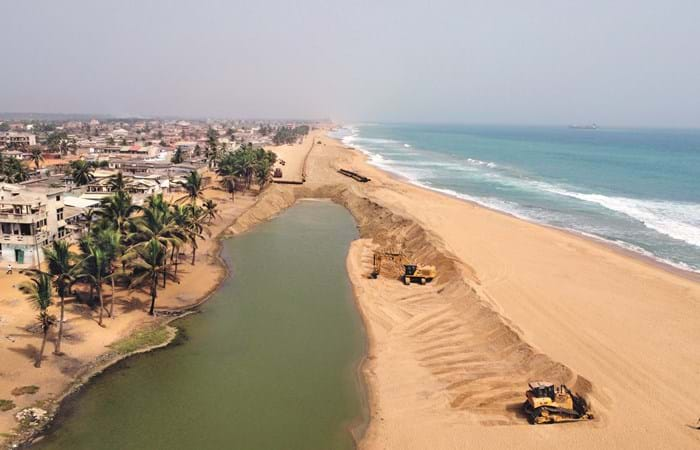The majority of our work takes place offshore, however, our operations can impact local communities at the coast or inland. Engaging with and managing our impact on local communities is an important part of our work. In many cases we create socio-economic value through the infrastructure we deliver, as well as via local job creation, procurement and community investment. Where we can, we seek to enhance these positive impacts. At the same time, we aim to avoid or minimize any negative social impact of our activities by applying and continuously improving our management of social risks.
The approach we take to managing potential social impact is in line with our Environmental and Social Policy. Each project is subject to a two-stage assessment process as follows:
The Environmental & Social (E&S) Impact Scan enables us to apply a consistent approach to E&S management and thereby identify the projects that need our attention. The Scan is part of our ISO 9001 quality management system, the Way of Working, and covers a broad set of E&S risks and opportunities and project requirements. Conducted during the tender phase, it enables the early recognition of potential E&S issues, as well as the prioritization of specific resources and expertise.
The Environmental & Social Review process standardizes the way we review environmental and social risks and opportunities in projects, once they have been highlighted by the E&S Impact Scan. This way Boskalis is better able to systematically review, prioritize and address potential environmental and social risks and opportunities, and effectively incorporate measures into project design and activities. In some cases, our work is a small part of a larger project scope that has wider-reaching social impacts. As a contractor this can present a dilemma as we may have limited influence over our client or the local social or political context. In these situations, where possible, we exert leverage to encourage social impact management practices in the chain. There are five areas to our social impact approach:
Social risk & opportunity assessment we aim for the early identification of social risks and opportunities as part of our standard risk and opportunities approach. This helps us to create the necessary awareness and support an effective social management strategy at the project level. Depending on the local stakeholder landscape, we develop a stakeholder management plan that may include on-site community liaison officers to engage with local communities and support stakeholder consultation processes.
Stakeholder engagement Depending on the local stakeholder landscape, we develop a stakeholder management plan that may include on-site community liaison officers to engage with local communities and support stakeholder consultation processes
Grievance management Boskalis strives for open and clear communication with our various external stakeholders and is open to suggestions, ideas, complaints, grievances and criticism. The Grievance Policy describes how we offer our external stakeholders the possibility to bring forward any grievance without the risk of any retaliation. Grievances may be treated on a confidential basis upon request and can be made anonymously on a 24/7 basis. At project level, Boskalis frequently offers a targeted local grievance mechanism to ensure transparency and engagement with our local stakeholders. Such grievance mechanisms are based on the Grievance Policy.
Community contribution and local development we recognize our ability to stimulate positive community impacts through local job creation, local procurement, skills development and training, as well as the benefits of the new infrastructure that we create. Where possible, we seek to benefit communities by maximizing these elements in our projects and through measures such as capacity-building and skills transfer we also help create opportunities for the community in the longer term.
Community welfare and health and safety our human rights and labor principles are a fundamental part of the way we do business. Through our safety behavior program, No Injuries, No Accidents (NINA) we take care of the safety, security and health of everyone involved in our activities.
